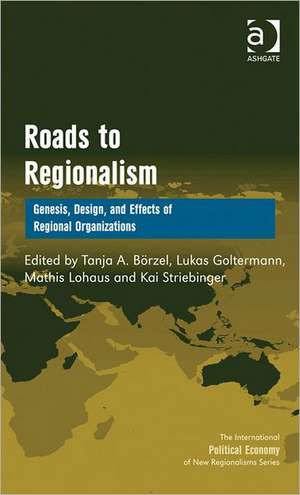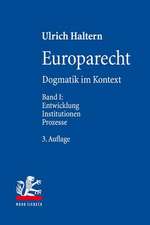Roads to Regionalism: Genesis, Design, and Effects of Regional Organizations: New Regionalisms Series
Autor Tanja A. Börzel, Lukas Goltermann, Kai Striebingeren Limba Engleză Hardback – 28 mar 2012
| Toate formatele și edițiile | Preț | Express |
|---|---|---|
| Paperback (1) | 489.26 lei 43-57 zile | |
| Taylor & Francis – 17 noi 2016 | 489.26 lei 43-57 zile | |
| Hardback (1) | 1061.81 lei 43-57 zile | |
| Taylor & Francis – 28 mar 2012 | 1061.81 lei 43-57 zile |
Din seria New Regionalisms Series
-
 Preț: 312.34 lei
Preț: 312.34 lei -
 Preț: 311.41 lei
Preț: 311.41 lei -
 Preț: 295.53 lei
Preț: 295.53 lei - 15%
 Preț: 715.33 lei
Preț: 715.33 lei - 15%
 Preț: 672.40 lei
Preț: 672.40 lei - 18%
 Preț: 1060.25 lei
Preț: 1060.25 lei - 18%
 Preț: 1000.27 lei
Preț: 1000.27 lei -
 Preț: 374.20 lei
Preț: 374.20 lei -
 Preț: 374.58 lei
Preț: 374.58 lei - 28%
 Preț: 818.67 lei
Preț: 818.67 lei - 31%
 Preț: 765.43 lei
Preț: 765.43 lei - 18%
 Preț: 1003.43 lei
Preț: 1003.43 lei - 15%
 Preț: 703.90 lei
Preț: 703.90 lei - 30%
 Preț: 768.10 lei
Preț: 768.10 lei - 31%
 Preț: 766.85 lei
Preț: 766.85 lei - 30%
 Preț: 768.64 lei
Preț: 768.64 lei -
 Preț: 380.54 lei
Preț: 380.54 lei - 31%
 Preț: 766.31 lei
Preț: 766.31 lei - 30%
 Preț: 769.37 lei
Preț: 769.37 lei - 31%
 Preț: 767.20 lei
Preț: 767.20 lei - 30%
 Preț: 770.98 lei
Preț: 770.98 lei - 18%
 Preț: 1054.71 lei
Preț: 1054.71 lei - 28%
 Preț: 821.82 lei
Preț: 821.82 lei -
 Preț: 369.73 lei
Preț: 369.73 lei - 18%
 Preț: 1057.40 lei
Preț: 1057.40 lei - 18%
 Preț: 1005.01 lei
Preț: 1005.01 lei - 18%
 Preț: 1008.17 lei
Preț: 1008.17 lei - 18%
 Preț: 1109.66 lei
Preț: 1109.66 lei - 15%
 Preț: 669.94 lei
Preț: 669.94 lei - 18%
 Preț: 1055.84 lei
Preț: 1055.84 lei - 18%
 Preț: 1006.60 lei
Preț: 1006.60 lei - 18%
 Preț: 703.30 lei
Preț: 703.30 lei - 15%
 Preț: 703.08 lei
Preț: 703.08 lei - 18%
 Preț: 1056.00 lei
Preț: 1056.00 lei - 28%
 Preț: 825.63 lei
Preț: 825.63 lei - 18%
 Preț: 1056.95 lei
Preț: 1056.95 lei - 18%
 Preț: 1000.27 lei
Preț: 1000.27 lei - 18%
 Preț: 1058.38 lei
Preț: 1058.38 lei - 15%
 Preț: 669.94 lei
Preț: 669.94 lei - 30%
 Preț: 849.78 lei
Preț: 849.78 lei - 28%
 Preț: 822.86 lei
Preț: 822.86 lei - 18%
 Preț: 1005.80 lei
Preț: 1005.80 lei - 18%
 Preț: 1056.28 lei
Preț: 1056.28 lei - 31%
 Preț: 766.31 lei
Preț: 766.31 lei - 18%
 Preț: 1057.09 lei
Preț: 1057.09 lei - 30%
 Preț: 769.37 lei
Preț: 769.37 lei - 18%
 Preț: 1108.37 lei
Preț: 1108.37 lei - 30%
 Preț: 847.31 lei
Preț: 847.31 lei - 28%
 Preț: 737.94 lei
Preț: 737.94 lei
Preț: 1061.81 lei
Preț vechi: 1294.89 lei
-18% Nou
Puncte Express: 1593
Preț estimativ în valută:
203.24€ • 220.84$ • 170.83£
203.24€ • 220.84$ • 170.83£
Carte tipărită la comandă
Livrare economică 21 aprilie-05 mai
Preluare comenzi: 021 569.72.76
Specificații
ISBN-13: 9781409434641
ISBN-10: 1409434648
Pagini: 296
Dimensiuni: 156 x 234 x 18 mm
Greutate: 0.66 kg
Ediția:1
Editura: Taylor & Francis
Colecția Routledge
Seria New Regionalisms Series
Locul publicării:Oxford, United Kingdom
ISBN-10: 1409434648
Pagini: 296
Dimensiuni: 156 x 234 x 18 mm
Greutate: 0.66 kg
Ediția:1
Editura: Taylor & Francis
Colecția Routledge
Seria New Regionalisms Series
Locul publicării:Oxford, United Kingdom
Notă biografică
Tanja A. Börzel is Professor of Political Science and Chair of European Integration at the Free University Berlin, Germany. Lukas Goltermann is a research assistant at Humboldt University Berlin, Germany. Mathis Lohaus is a research assistant at the Collaborative Research Center 'Governance in Areas of Limited Statehood' Berlin, Germany. Kai Striebinger is a PhD candidate at the Berlin Graduate School for Transnational Studies, Germany.
Recenzii
'This excellent volume is a valuable source of new knowledge of 'old' regionalism and an inspiring guide for further research. It succeeds in clarifying convincingly different aspects of the dynamics between ROs and their member states. It carefully avoids two typical pitfalls; a normative bias (regionalism as intrinsically good or bad) and Euro-centrism. It shows the usefulness of theoretical pluralism and the fruitfulness of sound comparative work, explaining similarities and differences in such widely diverging contexts as Eurasia, the Arab world, Africa, Asia and the Americas. It raises questions which will guide future research on old and new regionalism alike.' Anna van der Vleuten, Radboud University Nijmegen, The Netherlands 'This very well researched volume is a valuable contribution to the study of regionalism and regional organizations. It covers most relevant contemporary regional organizations through four central aspects: their genesis and growth, institutional design, member-states behavior and effects of member-states. The analysis includes economic, cultural, political and institutional characteristics of organizations in an analytical framework that allows for great complexity. The volume succeeds in building a much needed bridge between European Integration studies and the New Regionalism Approach, and in making a case for the importance of regional organizations in the emerging systems of global governance.' Andrea Ribeiro Hoffmann, Universität Erfurt, Germany 'A theoretically-eclectic volume resulting from dedicated workshops on the topic, it offers a common framework for understanding variation in the role of regional organizations across the world. The editors should be congratulated for gathering a new generation of scholars bound to expand the analytical and empirical horizons in the study of regionalism.' Etel Solingen, University of California, Irvine, USA '... readers interested in regionalism will find the volume helpful and inspiri
Cuprins
1: Introduction; 1: Roads to Regionalism: Concepts, Issues, and Cases; 2: Genesis and Growth; 2: Ephemeral Regionalism: The Proliferation of (Failed) Regional Integration Initiatives in Post-Soviet Eurasia; 3: Joining the Neighbors: The Accessions to ASEAN in the 1990s; 4: MERCOSUR: Integration through Presidents and Paymasters; 3: Institutional Design; 5: Explaining Differences in the Institutional Design of ASEAN and NAFTA; 6: Why Did NAFTA and ASEAN Set Up Dispute Settlement Procedures?; 7: Institutional Similarities Between Regional Organizations: An Analysis of ECOWAS and the Arab League; 4: Member States' behavior; 8: Does Regime Type Matter? Regional Integration from the Nation States' Perspectives in ECOWAS; 9: State Capacity and Compliance in ASEAN; 10: When Pigs Fly: ECOWAS and the Protection of Constitutional Order in Events of Coups d'État; 5: Effects on Member States; 11: MERCOSUR's Contribution to Democratic Consolidation; 12: ASEAN and Civil Society: An Incompatible Relationship?; 13: Monetary Integration Through the Backdoor: Does NAFTA Promote Monetary Policy Harmonization in North America?; 6: Conclusion; 14: Do All Roads Lead to Regionalism?
Descriere
Many publications focus on a narrow set of regional organizations or display a strong bias towards the European Union as the supposedly most sophisticated integration scheme. This book, in contrast, goes beyond Europe and takes a comparative approach across space and time to look at regional organizations in North and South America, Africa, the Middle East, and Asia.













